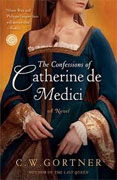The Confessions of Catherine de Medici
C.W. Gortner
book reviews:
· general fiction
· chick lit/romance
· sci-fi/fantasy
· graphic novels
· nonfiction
· audio books
· author interviews
· children's books @
curledupkids.com
· DVD reviews @
curledupdvd.com
newsletter
win books
buy online
links
home
for authors
& publishers
for reviewers

 |
The Confessions of Catherine de Medici C.W. Gortner Ballantine Paperback 432 pages May 2011 |
|
Balancing historical events with a fictional account of Catherine de Medici, Gortner has created a fascinating portrait of power, politics and religion, a vast canvas where factions battle for men’s souls and Medici fights on behalf of her children’s interests, her sons heir to the throne of France: “Love is a treacherous emotion. You’ll fare better without it.” Expelled from Florence and the long shadow of her esteemed great-grandfather Lorenzo de Medici, Il Magnifico, in France Catherine becomes daughter-in-law to Francois I, wife of the Duc de Orleans.
Gortner takes great pains to define this complicated, driven woman, wounded by her husband’s lack of loyalty and affection for another woman, yet resolute in her sense of duty. As the brutal events of the era unfold - not the least of which the St. Bartholomew’s Day Massacre - legend has made much of Catherine’s dependence on Nostradamus and her own gifts as a seer. Whether an “Italian Jezebel” who cannot be trusted or a courageous mother fighting on behalf of her heirs, Medici is caught in a maelstrom of religious intolerance, the great agonizing and brutal clash between Roman Catholics and the French Reformist Huguenots. This deep distrust and betrayal marks Catherine’s years as queen and queen mother, the bargains made and the blood shed in the name of religious causes, as well as flawed personal judgments in matters of the heart. Gortner’s novel draws its power from conflict: the real Catherine de Medici vs. the public perception born of myth; the bloody battles of religious factions; and the justifiable paranoia of men who bond together in purpose only to be betrayed. As in his fascinating historical novel The Last Queen, where he gave Isabella of Castile (Juana de Loca) a more human face, Gortner captures the inherent contradictions in Catherine’s nature, the uncertainties of power and the desire for peace as well as devastating personal losses in love and family, all set against the lush beauty of the Loire Valley, the battlefields of religious war and the dark hours of the night where screams rend the air, swords flash and death hangs heavy as a yoke. This is a broad and brutal tale, where even secret incantations cannot reverse the hand of fate and a final compromise to save France from chaos. Catherine de Medici may be captured in these pages, or mythologized, but the author defines this woman in the context of her times and the chaos that bedeviled France during much of her reign as queen and queen mother. That Gortner manages to weave the history of the era with the personal failures and triumphs of a legendary figure is a testament to his appreciation of the historical impact of religion and power, battles won and lost in the name of God. Originally published on Curled Up With A Good Book at www.curledup.com. © Luan Gaines, 2010 |
| Also by C.W. Gortner: |
|
|
|
 Click here to learn more about this month's sponsor! |
|
| fiction · sf/f · comic books · nonfiction · audio newsletter · free book contest · buy books online review index · links · · authors & publishers reviewers |
|
| site by ELBO Computing Resources, Inc. | |
 Eventually sharing the throne of France with her husband, Catherine is in impressive company, a sixteenth-century legend along with Elizabeth I of England and Mary, Queen of Scots. Like these other powerful female rulers, Catherine is pitted against the scheming of men who seek power for themselves. Widowed at age forty, Catherine’s mission in life is to protect her sons as each assumes the role of king.
Eventually sharing the throne of France with her husband, Catherine is in impressive company, a sixteenth-century legend along with Elizabeth I of England and Mary, Queen of Scots. Like these other powerful female rulers, Catherine is pitted against the scheming of men who seek power for themselves. Widowed at age forty, Catherine’s mission in life is to protect her sons as each assumes the role of king.